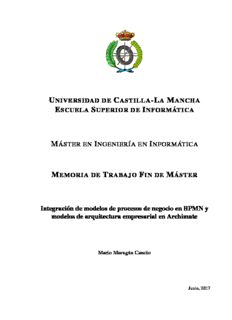
Integración de modelos de procesos de negocio en BPMN y modelos de arquitectura empresarial ... PDF
Preview Integración de modelos de procesos de negocio en BPMN y modelos de arquitectura empresarial ...
U C -L M NIVERSIDAD DE ASTILLA A ANCHA E S I SCUELA UPERIOR DE NFORMÁTICA M I I ÁSTER EN NGENIERÍA EN NFORMÁTICA M T F M EMORIA DE RABAJO IN DE ÁSTER Integración de modelos de procesos de negocio en BPMN y modelos de arquitectura empresarial en Archimate Mario Marugán Cancio Junio,2017 U C -L M NIVERSIDAD DE ASTILLA A ANCHA E S I SCUELA UPERIOR DE NFORMÁTICA M I I ÁSTER EN NGENIERÍA EN NFORMÁTICA M T F M EMORIA DE RABAJO IN DE ÁSTER Integración de modelos de procesos de negocio en BPMN y modelos de arquitectura empresarial en Archimate Autor: Mario Marugán Cancio Director: Francisco Ruiz González Junio,2017 T : RIBUNAL Presidente: Vocal : Secretario: F : ECHA DE DEFENSA C : ALIFICACIÓN PRESIDENTE VOCAL SECRETARIO Fdo.: Fdo.: Fdo.: Resumen Enlostiemposactualesescadavezmáselinterésporeldesarrollodesoftwaredirigido pormodelos,tantoporpartedelacomunidadacadémicacomodelaindustria.Elusosistemá- ticodemodelosenlasdiferentes etapas delciclodevidadelsoftwarees elfundamentode la tecnología de desarrollo de software dirigido por modelos (DSDM), en inglés Model- DrivenSoftwareDevelopment(MDSD),osimplementeMDD,aplicaciónalproblemade hacer software del paradigma de ingeniería dirigida por modelos (en inglés Model Driven Engineering[MDE]).Graciasalosmodelosysusmetamodelos(respectodeloscualeslos primerosdebensercorrectos)podemoselevarelniveldeabstracciónydeautomatización,con locualpodríamosminimizarunodelosproblemasprincipaleseneldesarrollodesoftware, comoesel dominiodelacomplejidad,y permitirmejorasdecalidaden laproductividadyel mantenimiento. Dosejemplos delaimportancia quehancobrado losmodelos enelámbito delasTI en general, son Archimate y BPMN. El primero es un estándar (metamodelo y lenguaje de modelado)ideadoparacrearmodelosdearquitecturaempresarial,quesonrepresentaciones integradasdetodoslosaspectosdeinterésenunaorganización,desdeestrategiahastahardwa- re,pasandopornegocioysistemas.Elsegundoeselestándarparamodelaryautomatizarlos procesosdenegocio,esdecir,losprocesosquelasorganizacionesllevanacaboparalograr susobjetivos.Ambossecomplementan,deformaqueenunmodeloArchimate,unproceso es uno de los muchos tipos de elementos manejados, mientras que un modelo BPMN nos serviráparaexpresarelinteriordelprocesocontodoslosdetallesnecesarios. EnesteTrabajoFindeMástersehansidoanalizadaslasrelacionesentrelosmetamodelos deBPMNyArchimateparaasípoderidentificarydefinirlosmapeosentreloselementosde modelosArchimateyBPMN. Debido alo mencionando anteriormente, seha decidido realizar untrabajo de investiga- ción y utilizar Design Science y Action-Research como metodologías I+D, con SCRUM adaptadocomometodologíaágilparala gestióndelproyecto.Seutilizará ECORE parala representacióndelosmetamodelosyATLparasustransformaciones. LasaportacionesmásimportantesdeesteTFMsonlaidentificacióndelasrelacioneso mapeossemánticosentreelementosdeambosmetamodelosyladefinicióndelasreglasde transformaciónenambasdirecciones,deBPMN2aArchimate3ydeArchimate3aBPMN2. Conello sepretendefacilitarlageneración automáticademodelos Archimate desdemodelos deBPMNyviceversa,demodelosBPMNdesdemodelosArchimate. La realización de este Trabajo Fin de Máster ha supuesto para mí la puesta en práctica delosconocimientosaprendidosalolargodelmáster,desdeelconocimientodellenguaje, modelosymetamodelosdeBPMNyArchimatevistosenelmáster,hastalaidentificación, análisis y transformación de un modelo a otro a través de su metamodelo, pasando por la realizacióndelplandeproyectoyunestudiodeviabilidad. vii Abstract Inrecenttimes,thereisanincreasinginterestinthedevelopmentofmodel-drivensoftware, both by the academic community and industry. The systematic use of models at different stages of the software life cycle is the foundation of technology Model-Driven Software Development(MDSD),orsimplyMDD,Applicationtotheproblemofmakingmodeldriven engineering paradigm software (Model Driven Engineering [MDE]). Thanks to the mod- els and their metamodels (for which the former must be correct) we can raise the level of abstraction and automation, which could minimize one of the main problems in software development,suchasthedomainofComplexity,andenablequalityimprovementsinproduc- tivityandmaintenance.. TwoexamplesoftheimportanceofthemodelsinthefieldofITingeneralareArchimate andBPMN.Thefirstisastandard(metamodelandmodelinglanguage)designedtocreate businessarchitecturemodels,whichareintegratedrepresentationsofallaspectsofinterestin an organization, from strategy to hardware, to business and systems. Two examples of the importance of the models in the field of IT in general are Archimate and BPMN. Both are complementary,sothatinanArchimatemodel,aprocessisoneofmanytypesofelements handled, while a BPMN model will serve to express the interior of the process with all the necessarydetails. Thefirstisastandard(metamodelandmodelinglanguage)designedtocreatebusiness architecture models, which are integrated representations of all aspects of interest in an organization,fromstrategytohardware,tobusinessandsystems. In this Work End of Master have been analyzed the relationship between metamodel ofBPMNandArchimateinordertoidentifyanddefinethemappingbetweenBPMNand Archimatemodels. Duetomentioningabove,ithasdecidedtoconductaresearchprojectandusing Design Science and Action-Research and R & D methodologies, with SCRUM adapted as agile methodology for project management. ECORE being used for the representation of the metamodelandATLfortheirtransformations. ThemostimportantcontributionsofthisTFMaretheidentificationofthesemanticrela- tionsor mappings betweenelements ofboth metamodelsand thedefinition oftransformation rules in both directions, from BPMN 2 to Archimate 3 and from Archimate 3 to BPMN 2. This is intended to facilitate the automatic generation of Archimate models from BPMN modelsandviceversa,fromBPMNmodelsfromArchimatemodels. TheachievementofthisWorkEndofMasterhassupposedformetheputtinginpractice of the knowledge learned along the master, from the knowledge of language, models and metamodelsofBPMNandArchimateseeninthemaster,totheidentification,analysisand transformationfromonemodeltoanotherthroughitsmetamodel,throughtherealizationof theprojectplanandafeasibilitystudy. ix
Description: